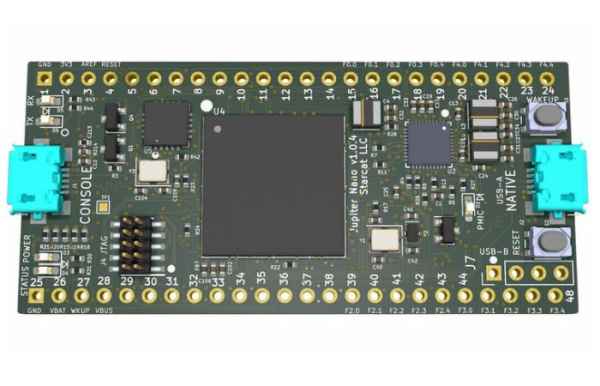A small yet high-performance computer capable of running Linux will be launching via the Crowd Supply website very soon in the form of the Jupiter Nano. The small open source development board is equipped with a Microchip SAMA5D27C-LD1G running at 498 Mhz and is capable of running NuttX RTOS or Linux. The tiny 48-pin form factor measures just 1.125″ x 2.5″, similar in size to Teensy 4.1.

“Jupiter Nano is perfect for Arduino users who need a tiny, powerful computer with more CPU power, lots of RAM, or an internet-connected real time operating system (NuttX). It should also be attractive to any Linux users who need a tiny, open-source hardware computer with lots of I/O and high-speed Wi-Fi. The applications for a board this small, and this powerful, are nearly endless.”
For more information jump over to the official product page on the Crowd Supply website by following the link below.
- Open source hardware development board
- Runs NuttX RTOS or Linux
- Size: Tiny 48-pin form factor (1.125″ x 2.5″, similar in size to Teensy 4.1)
- Programming: JTAG port for programming and debugging
- CPU: Microchip SAMA5D27C-LD1G running at 498 Mhz
- DRAM: AP Memory AD2100XXX 128 M x 32 LPDDR2 DRAM chip integrated into system-in-package (SIP)
- Power management: Qorvo ACT8945A with integrated LiPo battery charging capability
- Power delivery: Compatible with many LiPo batteries
- Designed in KiCAD: the hardware design can be altered using 100% open source KiCAD software
- 10x more powerful than the Arduino Due:
- ARM Cortex A5 processor running at 498 Mhz (7x clock speed of the Arduino Due)
- 128 MB RAM (1280x RAM of Arduino Due)
- Key peripherals use DMA (USB, SPI, I2C, Flexcom)
- I/O:
- USB 2.0 HS port on USB-micro B jack (Port A, 480 Mbps, host or device)
- USB 2.0 HS port on a pin-header connection (Port B, 480 Mbps, host only)
- USB 2.0 FS Debug console port on USB-micro B jack (12 Mbps)
- SD Card slot – 50 MHz DDR – device boots from the card (this means it is impossible to brick the device)
- Native SPI and I2C ports
- 4 FLEXCOMs on I/O pins – flexible serial controller peripherals that can be SPI, UART, or I2C
Read more: Jupiter Nano open source development board
